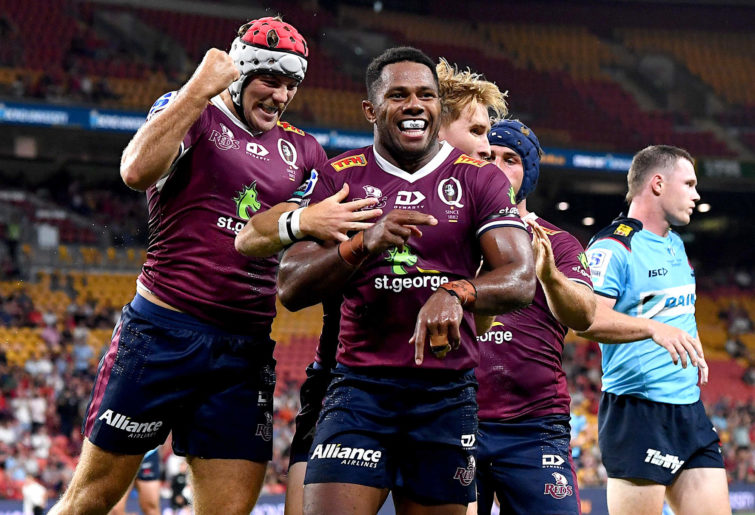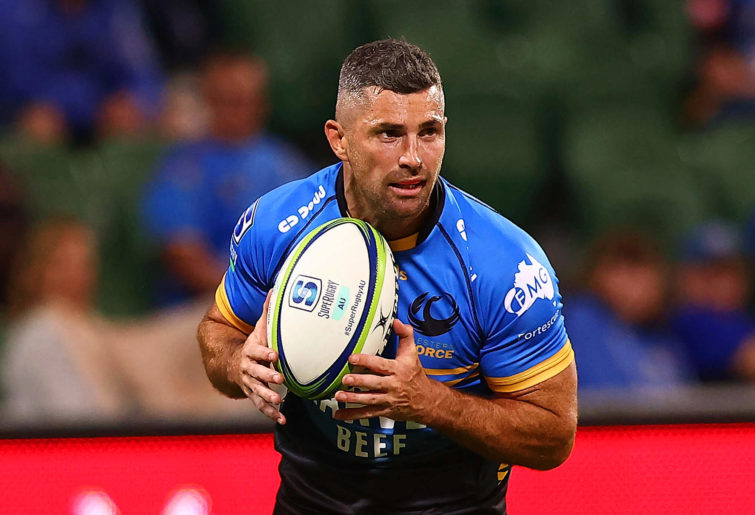A month ago my season preview article 'Injuries and depth to determine Super Rugby AU' looked at the potential difficulties in store for Australia's franchises should they be forced to mine the depths of their rosters.
It's taken only four rounds for that sore to be uncovered, although it's fair to say that few people would have expected that it would be the Brumbies, specifically their front row, that would be hit hardest.
Despite a second lineout maul try after halftime taking the home side out to 31-16 there was always a feeling that they would need every single point and more. With the novice Brumbies front row exposed, the Reds' Taniela Tupou smelled blood in the water, and inevitably the tries came, in the 61st and 68th minutes.
With every scrum as good as a penalty, the question became: could the Brumbies avoid scrums for another 12 minutes? The answer was no.
Little tactical errors were made, with Brumbies players' natural rugby instinct kicking in, diving on spilt balls to recover possession when a better option would have been to let the Reds secure the ball under advantage rather than let them scrum their way to another penalty.
This may seem counter-intuitive, but my highlight of the match came in the 72nd minute when the Brumbies, on the ropes with the referee almost set to call off the fight, put together a superb period of committed phase play to create a fine try on the right wing for Issak Fines-Leleiwasa followed by a great sideline conversion by Ryan Lonergan.
This was the hallmark of a gutsy, composed, classy side.
Unfortunately the lowlight came straight afterwards when Rob Valetini, who otherwise enjoyed an outstanding match, dropped the kick-off cold. Instead of a controlled exit, it meant another scrum and more heartache in the way of a James O'Connor penalty goal to close the deficit to five points.
The Brumbies still had an opportunity to pin the Reds back from their kick-off, but they failed to man up at the breakdown, allowing Seru Eru to gallop away unchallenged to set up the final stanza.
Despite being handed the keys to the door, the Reds still had to be good enough to close the match out. And there was something wholly satisfying about how the winning try came not from a pushover but from a slick backline grubber and chase, which Jordan Petaia finished off in spectacular fashion.

(Photo by Bradley Kanaris/Getty Images)
A consistent criticism of Super Rugby over the years, particularly from the northern hemisphere, is that high-scoring encounters often resemble 'festival rugby' as opposed to 'real' rugby – that is, something more akin to Test matches.
A 40-38 scoreline might suggest a tackle-shy romp, but in truth, this was a match with all of the intensity of last year's final. Full credit to all involved, including referee Nic Berry, who worked hard all night to keep the match ticking along.
While they are far from the finished product, there is a swagger about the Reds which will only be enhanced by their closing out a second close match in a row. They now return to Brisbane to host the Force and should close out the first round on top of the ladder and in the box seat to host a home final.
For the wounded Brumbies, the bye has arrived just in time. Fans at the ground may have been bemused at the sight of Roar colleague Brett McKay hurriedly downing multiple steak sandwiches in order to bulk up for a front-row call-up, but the harsh truth is that Dan McKellar has a fortnight to come up with a solution or face more hardship.
None of this of course is to demean Harrison Lloyd or Archer Holz, only to emphasize the gulf that exists between high-level Super Rugby performance and club rugby. It's a gap that very good players can bridge but almost always only via a gradual induction.
It was another tense finish in Perth, albeit in a match that failed to reach the same heights, with the Rebels ending their marathon road trip with a hard-scrapping 10-7 win over the Force.
I'm betting that the vast majority of Rebels fans wouldn't be able to pick Glen Vaihu out of a line-up, but they should make a point of it now. It was his late goal-line strip that was the pivotal moment in allowing his side to see off the Force's final press for victory.
What was most interesting about this match was that it contained three tries of high quality, yet by contrast the periods in between were marked by hesitancy, skill errors and questionable decision-making.
With both sides appearing to be in direct competition for the third and final playoff spot, each will have marked their two matches as must-wins. Mini-finals if you like. As a result this match was played in an air of inhibition and tension. And when there is tension, bodies and minds freeze up.
The Force seemed unclear all night about what their strategy should be with respect to kicking for goal or the corner. As it turned out, in such a low scoring match going for goal may well have served them better.

(Photo by Paul Kane/Getty Images)
Certainly that should have been the case in the 78th minute, with captain Ian Prior opting for a scrum instead of a shot at goal, which, if successful, would have sent his side into 'super time' with a one-man advantage.
While the Rebels were superior tactically, they demonstrated a lack of a clinical edge and composure when near the try-line, a feature that dogged their play last week and also throughout the 2020 season.
No-one can deny that they were due a change of luck, however, and the injury to bench prop Isaac Aedo-Kailea that allowed burgeoning cult hero Cabous Eloff to return for the final scrum turned out to be unintentionally fortunate.
With scrums such a pivotal part of the game and such a ready source of penalties and with player depth in the front row being severely tested, both matches walked a tightrope where shadier outcomes might have ensued.
The fact that Dan McKellar didn't send the hook out to remove a 'suddenly injured' front-rower and force the Reds to uncontested scrums is commendable. The fact that he could have done this had he chosen to is slightly uncomfortable.
Chiefs and All Black halfback Brad Webber appeals as a thoroughly likeable bloke, but in Christchurch on Saturday it seemed like there was nothing he could do to gain favour with referee James Doleman or TMO Paul Williams.
In the first half he was harshly penalised for offside at a critical scrum, then in the 43rd minute he went in the blink of an eye from saving a dangerous Richie Mo'unga attack to giving away a penalty try and being shown a yellow card.
The whole incident made a mockery of the 'captain's challenge', with Chiefs captain Sam Cane burning his challenge in a vain effort to save seven points and his halfback. Despite overwhelming evidence to uphold the challenge – Webber's timely contact to Mo'unga's arm forcing a huge forward pass in the lead up to a try – the officials seemed to be on a different wavelength.
And what about the fact that Cane was forced to challenge anyway? With a try being scored in the play and an obvious question mark existing about Mo'unga's pass in the lead-up, why wouldn't the TMO have investigated that of his own accord or at the referee's request instead of Cane being required to do their job for them?
Instead of Cane asking for the play to be reviewed, perhaps his first question should have been, "Is the TMO reviewing that pass?".
Sports opinion delivered daily
The captain's challenge is a concept that had barnacles on it right from the get-go. This clumsy episode will have won no converts.
Everyone knows that the team that least needs outside help is the Crusaders, and their 39-17 win was of course down to their relentless efficiency rather than any luck.
It was also down in part to the wonderful first-half finish by winger Leicester Fainga'anuku, whose effort to plant the ball in the corner without his left foot touching the ground was worthy of any Olympic high jumper.
And while you're checking that out, how about the pass on the run at full speed into space by David Havili? Sheer quality.
The match marked the 11th straight defeat for the Chiefs, but they are clearly an improved version of last season and a win cannot be too far away. Fresh from a gig with the 'Stray Cats', Damian McKenzie was as lively as ever from fullback, and there were good signs from emerging All Black lock Tupou Va'ai.
The weekend's action closed off with an identical score-line, 39-17, to the Blues, in an authoritative win over the Highlanders in Auckland.
What impresses most about this developing Blues side is the balance they have between forwards and backs. Rolling out a new 20-year-old lock the size of Eben Etzebeth doesn't hurt either.
Sam Darry is a Canterbury product who has traded off the opportunity to be schooled by Sam Whitelock for more playing opportunities with the Blues. On the evidence of his run-on debut it looks as if he'll be getting more of them.
The Highlanders dealt themselves out of the game early, ill-disciplined in their efforts to try to slow the Blues' recycle game. They'll have the obligatory 'look in the mirror' during their bye week, but it's time now to stop talking about discipline and actually start walking the talk.
The quality rugby didn't end there with the first half of England's 23-20 win over France as good as any Six Nations rugby seen in recent times.
There was some talk afterwards that France's COVID-interrupted preparation contributed to their second-half fade-out, but it would be churlish to take away from England's response to their disappointments against Scotland and Wales.
The title, and a grand slam, is now Wales's to lose, although any bets should be carefully considered and made with someone else's money. After all, who in their right mind would have bet four weeks ago that the Brumbies would be unable to hold their scrum up?






No comments:
Post a Comment